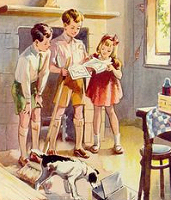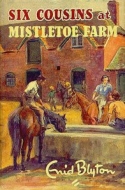
Six Cousins at Mistletoe Farm
Review by Keith Robinson (October 22, 2006)
This book has no hidden treasure, no smugglers, nor even a whiff of secret passages. There's a burglary that crops up, but other than that there's really nothing tangible going on in the lives of the six cousins aside from having to put up with each other for eight months. And this book is brilliant!
It just goes to show that Enid Blyton was at her best with the simple things in life – in this case how three siblings cope when their cousins come to live with them at Mistletoe Farm. After a fire burns down their lovely home at Three Towers, Uncle David and Aunt Rose are quite understandably distraught. What are they to do? David had foolishly let the insurance lapse, and so the house was not covered and the family must now start anew with what little remains in their possession. Rose, a pathetically weak, shallow woman, is unable to deal with the crisis and immediately moves into a nursing home, while David looks for work. But what about the poor children in the meantime? Where will Cyril, Melisande and Roderick stay?
It's this traumatic state of affairs that brings the children to Mistletoe Farm, owned and run by David's wiser brother, Peter Longfield and his wife Linnie. The Longfields of Mistletoe Farm have three children of their own, Jack, Jane and Susan, and together the family are very happy in their day-to-day running of the old-fashioned farm. Jack and Jane are twins, although they are entirely different in character. Jane is described as quick, talkative and impatient, while Jack is slow and silent with a fierce temper (although this rarely surfaces throughout the book, if at all). Jack and Jane are fifteen. Susan, their younger sister, is eleven and the most personable of the three, very honest and straightforward... if a little too honest at times! The children's mother is hard-working and down-to-earth, while their father, the big burly farmer, doesn't stand any nonsense from anyone he thinks is lazy or silly. Their cook, Dorcas, fits right in with the family – a fat, elderly woman with a bright red face who always says, "if a job is worth doing, it's worth doing properly."
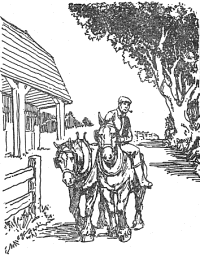
Indeed, she makes a similar comment about Aunt Rose, who is a very beautiful woman used to all the pretty things in life, but not very motherly. Aunt Rose cuddles and coddles her children, loving sixteen-year-old Cyril's long hair, sandles, flamboyant shirts and poetic ways; cooing over fifteen-year-old Melisande's blossoming beauty; and making an almighty fuss of her "darling Mother's boy" Roderick, who is younger than Susan and a little timid. Meanwhile, Uncle David – despite growing up on a farm with his brother Peter – has given up his farming ways and made a life with Rose in her "little palace."
Putting three namby-pamby children like Cyril, Melisande and Roderick together with three "farm-clods" like Jack, Jane and Susan is bad enough, but the situation is made worse because, in a moment of impatient "I haven't got time for nonsense," Mrs Longfield tells Jane that she must share with Melisande, and Jack with Cyril. Only Susan will keep her room to herself, while Roderick will have a tiny box room upstairs that has a gurgling cistern behind the wall. Naturally all six children are horrified with these arrangements. Jack has no room to move with all of Cyril's poetry books and clothes, and Cyril is upset with how basic and uncomfortably small the room is. Jane can't bear Melisande's endless array of perfumes and soaps, and likewise Melisande can't bear Jane's untidiness and the "farm" smell that follows her around. Susan has no problem at all, since she's left alone in her room, but poor Roderick has nightmares up in his box room and doesn't like the gurgling cistern at all.
Aunt Rose is horrible. She's just about the most uncaring, selfish, lazy woman you'd ever come across, despite her airs of superiority of the "awful Mistletoe Farm life." Right from the outset she's laid up in hospital – not from burns or smoke inhalation, but from "shock." This isn't entirely surprising, but then she moves from the hospital into a nursing home and spends a lot of her time in bed, being cared for while her husband heads to Scotland to take a job. Aunt Rose seems not to care that Linnie is taking on more work in caring for the three extra children; all she can care about is that her precious things have been burned and that her life of luxury may be at an end. Mrs Longfield goes to see Rose early on and outright tells her how selfish she is for laying about while others are struggling to make things work. Rose is hurt, and says, "You're very hard and cruel."
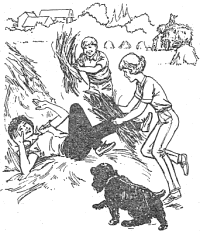
Overall the visit is a disaster. Cyril, Melisande and Roderick no longer like to sit inside on a bright sunny day and make polite conversation while drinking tea; now they want to be outside enjoying the farmlife in the fresh air. When Rose takes a nap, everyone heads for the fields to spread hay about, while Dorcas naps in the kitchen with instructions to call everyone back when Rose awakes. But Rose wakes early, and finds Dorcas napping and the rest of the house empty. Sniffing with disdain, feeling rather hurt, she sits alone in the dining room, silent, waiting for her four o'clock tea to be brought to her. In the end, growing angry with the way she's being ignored, she heads up into the fields in her high heels and is horrified to find not only Peter and Linnie, and their three children, but her own children too – all running about and rolling around in the hay having a whale of a time. Aunt Rose, feeling shunned by her own children, doesn't return to the farm for the rest of the story. And as she leaves, her children can't help feeling that they hardly know her anymore...
There's SO much to talk about in this story. It's a story about life itself – living and working hard on a farm; the difference between "farm-clods" and those who are used to the finer things that money can provide; and what really makes a person "worthwhile" when it comes right down to it. As you might expect, Enid Blyton effortlessly shows that even the dirtiest, smelliest farm-clod will always shine brighter than those lazy rich types who think themselves superior just because they can afford nice clothes. But Cyril, Melisande and Roderick have a good influence on Jack, Jane and Susan too, most notably when Jane finally realizes how little she cares for her own appearance and body odor, and spruces herself up a bit. Cyril, in his high-and-mighty way, makes the comment that Jack should carry pails of water upstairs for his mother; and Jack, suddenly ashamed, realizes his cousin is right. So there are lessons to be learned all round.
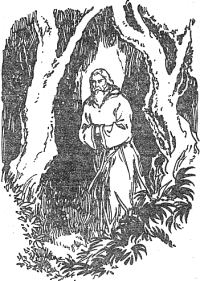
The resolution of the story is fairly predictable, but still very satisfying. A nearby farm is up for sale, and Mr Longfield decides to buy it – not for himself, but for his brother David's family. Being a very neat, modern farm, Rose is sure to agree to move in (albeit with the delusion that she can resume her life of luxury and not do a stitch of work) and it suits David perfectly because he can spend the rest of his days farming like his brother... doing what he had been born for. And the three children get to return to a higher-quality lifestyle yet continue working on a farm.
Best of all, the farms are only a few miles apart, so the children can always stay in touch. Oddly, although David reappears at the end of the book, Rose doesn't; it almost seems like Blyton had already made up her mind to write a follow up book dealing with "the return of Rose." Quite right too; Rose is a horrible person but a great character, and the whole reunion thing deserves more than a quick finishing chapter.
And that's why Six Cousins Again picks up from where this one leaves off...


